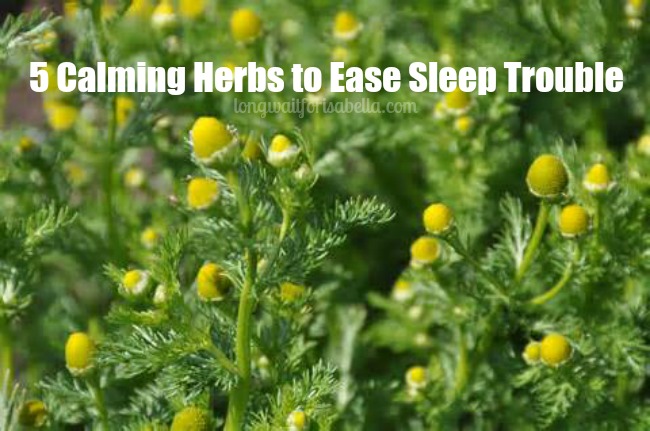I have never been a great sleeper. I sleep lightly and wake pretty easily. Thankfully, when woken up, I am able to fall back asleep pretty easily. My husband, on the other hand, cannot fall back asleep for hours if he is woken up in the middle of the night.
Are you a good sleeper?
5 Calming Herbs to Ease Sleep Trouble and Insomnia
The following herbs can be used during the day, or try using 20-30 minutes before bedtime:
Chamomile is a time-honored sedative herb which can be safely used by children and adults alike. Chamomile tea is commonly used in Europe, South America, and Mexico for insomnia and restlessness combined with irritability, particularly in children. Chamomile oil can also be put in bath water (5-6 drops) to soothe overwrought nerves, diluted to 2% to make an excellent massage oil, or used as an inhalant.
Dose: Tea, 1 cup 2-3 x daily; Tincture, 30 drops 3 x daily.
Lavender is a gentle strengthening tonic for the nervous system. A few drops of lavender oil added to a bath before bedtime are recommended for persons with sleep disorders. Additionally, the oil may be used as a compress, massage oil, or simply inhaled to alleviate insomnia.
Dose: Tea, 1 cup 2-3 x daily; Essential oil–oil may be inhaled, massaged into the skin (use 10 drops essential oil per ounce of vegetable oil), or added to baths (3-10 drops).
California Poppy is my favorite sedative and sleep-promoting herb which can currently be found in a variety of herbal remedies sold in the United States for promoting sleep, helping one to relax, and easing mild anxiety. Because of its mild sedative and analgesic properties, it can be given safely to children.
Dose: Tea, 1 cup 2-3 x daily; Tincture, 30-40 drops 2-3 x daily.
Note: Since the tea is mild, a tincture is recommended when a stronger dose is desired.
Passion Flower is considered by herbalists to be an important herb for insomnia caused by mental worry, overwork, or nervous exhaustion. In England it is an ingredient in forty different commonly-sold sedative preparations. Passion flower is used for minor sleep problems in both children and adults, and is safe even in large doses.
Dose: Tea, 1 cup 3 x daily; Tincture, 30-60 drops 3-4 x daily.
St. John’s Wort is a common yellow-flowered weedy herb from Europe that is quickly becoming an important part of modern herbal therapeutics. Modern scientific studies show that it can help relieve chronic insomnia and mild depression when related to certain brain chemistry imbalances. Because this herb can sensitize the skin to sunlight, if you are taking a full dose, avoid direct skin exposure to bright sunlight.
Dose: Tincture, 1/2 to 1 teaspoon 2-3 x daily; powdered extract, 1-2 tablets or capsules 2-3 x daily. Allow 2-3 weeks for the full therapeutic effect to develop.
Note: If you experience light sensitivity or other unpleasant symptoms, reduce or discontinue the St. John’s Wort and consult a qualified herbalist for a total program.
Do you have any sleep tips to add?
Thank you Dr. Christopher Hobbs, Director of Herbal Science at Rainbow Light for this guest blog post.




These are very interesting. I am so interested in learning about the California poppy we use chamomile tea and lavender oil. Thanks for the info
Great list of herbs to try. My husband always has trouble falling asleep and staying asleep. We are definitely going to try these.
This is a great post! My hubby has a hard time calming down and falling asleep, we use lavender but I didn’t know there were more options. Thanks!
I most definitely am going to try these I have been up all night and most of the day only getting a few hours of sleeping. Thank you for this info
Im going to try the passion flower tea. I need some help winding down at the end of the day.